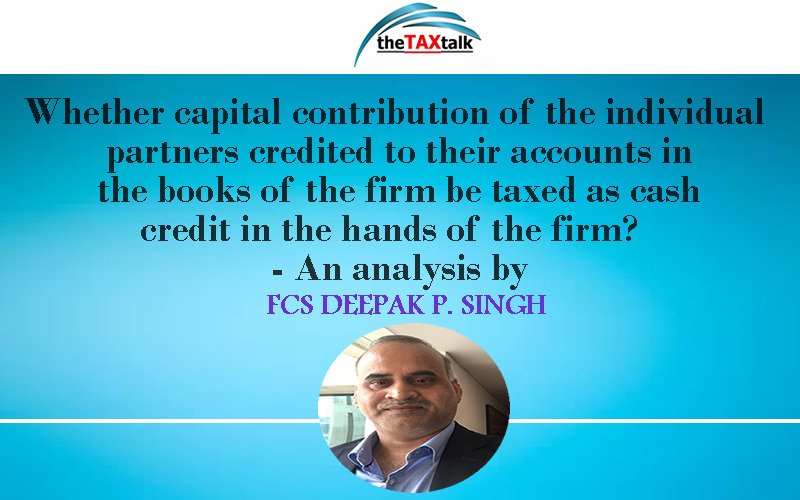![]()
Whether capital contribution of the individual partners credited to their accounts in the books of the firm be taxed as cash credit in the hands of the firm?
– An analysis by FCS Deepak Pratap Singh
Author 
FCS Deepak Pratap Singh
QUESTION: Can capital contribution of the individual partners credited to their accounts in the books of the firm be taxed as cash credit in the hands of the firm, where the partners have admitted their capital contribution but failed to explain satisfactorily the source of receipt in their individual hands?
FACTS OF THE CASE: The assessee-firm was constituted in the year 1982 and its return for the assessment year 1993-94 was selected for scrutiny under section 143(3).
The controversy was in relation to the capital contribution of ten partners aggregating to Rs. 76.57 lakhs.
The assessee-firm’s explanation that the partners have paid various amounts towards contribution of their share in the capital was not accepted by the Assessing Officer,since the source of income for the partners was not explained.
PLEASE NOTE THAT:It is settled law that a partnership firm is an assessable entity distinct from the individual partner. The books of account of a partnership cannot be treated as those of the individual partner. And in the case of the firm, the books maintained by the firm should show a cash credit entry and the firm’s explanation should be found unsatisfactory, then only Section 68 will entitle the ITO to include the amount of the entry as the income of the assessee-firm. The above position of law is enunciated from the principle that a partnership firm is an assessable entity distinct from its individual partners constituting the firm.IN CIT V. DAULAT RAM RAWATMULL, the Supreme Court held that the fact that the depositor had not been able to give a satisfactory explanation regarding the source of deposit would not be decisive even of the matters as to whether the depositor was or was not the owner of the amount, that a person could still be held to be the owner of a sum of money even though the explanation furnished by him regarding the source of that money was found to be incorrect, and that from the simple fact that the explanation regarding the source of the money had been found to be false, it would be a remote and farfetched conclusion to hold that the money belonged to the assessee.IN CIT V. KISHORILAL SANTOSHILAL IT WAS HELD THAT:
|
THE COMMISSIONER (APPEALS) observed that the amounts credited in the names of four partners were valid and that cash credits in the accounts of six other partners in the books of the firm were to be considered afresh by the Assessing Officer.
ISSUE UNDER CONSIDERATION: The issue before the High Court was whether the Assessing Officer was justified in treating the capital contribution of partners as income of the firm by invoking section 68?
HIGH COURT’S OPINION: Section 68 directs that if an assessee fails to explain the nature and source of credit entered in the books of account of any previous year, the same can be treated as income. In this case, the amount sought to be treated as income of the firm is the contribution made by the partners to the capital. In a way, the amount so contributed constitutes the very substratum for the business of the firm and it is difficult to treat the pooling of such capital as credit.
It is only when the entries are made during the course of business, they can be subjected to scrutiny under section 68.
Where the firm explains that the partners have contributed capital, section 68 cannot be pressed into service. At the most, the Assessing Officer can make an enquiry against the individual partners and not the firm when the partners have also admitted their capital contribution in the firm.
The High Court made reference to decision in the case of CIT v. Anupam Udyog 142 ITR 130 (Patna) where it was held if there are cash credits in the books of the firm in the accounts of the individual partners and it is found as a fact that cash was received by the firm from its partner, then, in the absence of any material to indicate that they are the profits of the firm, the cash credits cannot be assessed in the hands of the firm, though they may be assessed in the hands of individual partners.
In Lakshmichand Baijnath v. The Commissioner of Income-tax, West Bengal it was held that if there is no source of income other that business for which the assessee has maintained books which disclose cash credits, the presumption is that the cash credits represent income from the same business. Thus, in Commissioner of Income-tax v. Margaret’s Hope Tea Co. Ltd. the cash credits appearing in the books of the assessee whose main activity was the cultivation, manufacture and sale of tea, was held to be treated as income of the assessee from its tea business.
As decided in Abhyudaya Pharmaceuticals v Commissioner of Income Tax12, wherein the earlier decision in the case of Jaiswal Motor Finance was followed on the point that if there are cash credit entries in the books of the assessee firm in which accounts of an individual partner exists, and it is found as a fact that the cash was received by the firm from its partners then in the absence of any material to indicate that the same were profits of the firm, it could not be assessed in the hands of the firm
In the case of Kapur Brothers [1979] 118 ITR 741 (All) and Jaiswal Motor Finance [1983] 141 ITR 706 (All) is conflicting, but on a meaningful reading thereof, would show that they were rendered in different factual the ratio laid down in the case of Kapur Brothers [1979] 118 ITR 741 (All) will be applicable in a case where a partner brings capitalamount at the formation of the firm itself, before the commencement of business by the firm. It would not be applicable in a case where the deposit is reflected in the account books of the firm during the currency of the business of the firm.
The underlying idea in the case ofKapur Brothers [1979] 118 ITR 741 (All) is that when the assesseefirm has no business, it cannot possibly have any income. Therefore, in such a case the question of presumption of income of the assesseefirm would not arise generally. But it is not appropriate when the assesseefirm is earning income from its business and in that situation the assesseefirm has to explain the cashcredit standing in its account. If the above line of distinction is kept in mind, we find that both the decisions are standing on a different factual background.
HIGH COURT’S DECISION: The High Court, accordingly, held that the view taken by the Assessing Officer that the partnership firm has to explain the source of income of the partners as regards the amount contributed by them towards capital of the firm, in the absence of which the same would be treated as the income of the firm, was not tenable.
CONCLUSION: we are aware that provisions of Section 68 of the Income Tax Act, 1961 are applicable on entries made during the course of business of an entity. The court has also cleared that in case if there found cash credits in books of account of the firm in any partner’s account and there is nothing to prove that cash credits are profits of the company, in this case the cash credits will be assessed in the hands of respective partner and not in hands of firm. Please note that in case of cash credit found in the books of account of firm as Capital Contribution by the partners of the firm. Then provisions of Section 68 are not applicable. It will be applicable only those entries which arises during the course of business of firm.
DISCLAIMER: the above case law is only for information and knowledge of readers. in case of necessity do consult with tax professionals.
Footnotes:
THE PROVISIONS RELATING TO TAX TREATMENT OF CASH CREDIT ARE GIVEN IN SECTION 68. As per section 68, any sum found credited in the books of a taxpayer, for which he offers no explanation about the nature and source thereof or the explanation offered by him is not, in the opinion of the Assessing Officer, satisfactory, may be charged to income-tax as the income of the taxpayer of that year.
In case of a taxpayer being a closely held company (i.e., not being a company in which the public are substantially interested), if the sum so credited consists of share application money, share capital, share premium or any such amount by whatever name called, any explanation offered by such company shall be deemed to be not satisfactory, unless:
(a) the person, being a resident in whose name such credit is recorded in the books of such company, also offers an explanation about the nature and source of such sum so credited; and
(b) such explanation in the opinion of the Assessing Officer has been found to be satisfactory. The above discussed provisions of share application money, share capital, etc., shall not apply if the person, in whose name such sum is recorded, is a venture capital fund or a venture capital company as referred to in section 10(23FB).
CONDITIONS TO BE SATISFIED FOR APPLICABILITY OF SECTION 68
From the reading of section 68, following conditions can be stated to attract the applicability of section 68:
-
Assessee has maintained ‘books’ There has to be credit of amounts in the books maintained by the taxpayer of a sum during the year.
-
The taxpayer offers no explanation about the nature and source of such credit found in the books or the explanation offered by the taxpayer in the opinion of the Assessing Officer is not satisfactory.
-
If the taxpayer is a closely held company and the sum so credited consists of share application money, share capital, share premium or any such amount by whatever name called, any explanation offered by such company shall be deemed to be not satisfactory, unless:
-
the person, being a resident in whose name such credit is recorded in the books of such company, also offers an explanation about the nature and source of such sum so credited; and
-
such explanation in the opinion of the Assessing Officer has been found to be satisfactory. If all the above conditions exist, sum so credited may be charged to tax as income of the taxpayer of that year.


